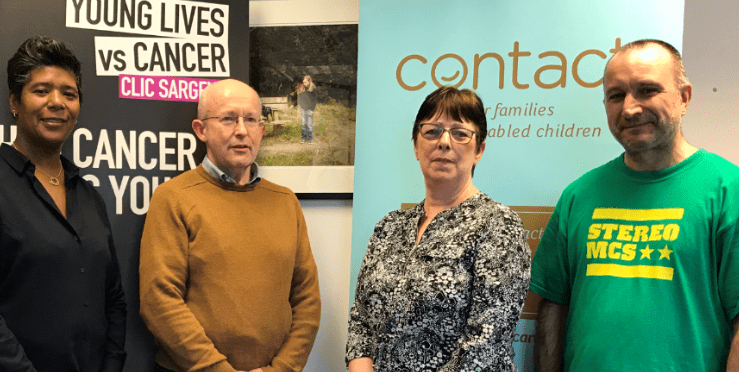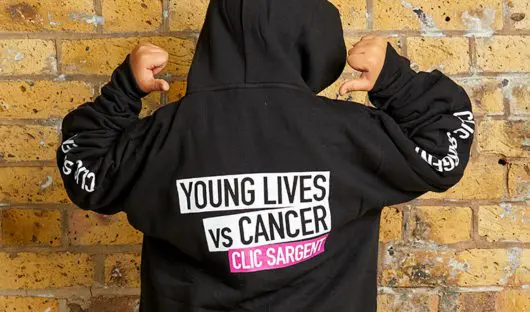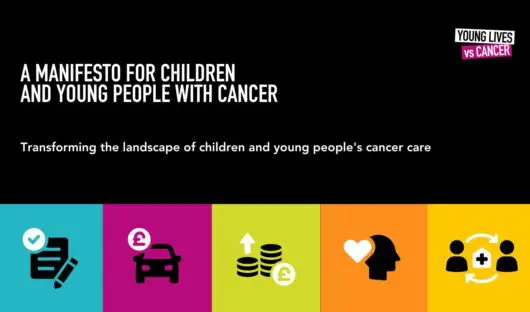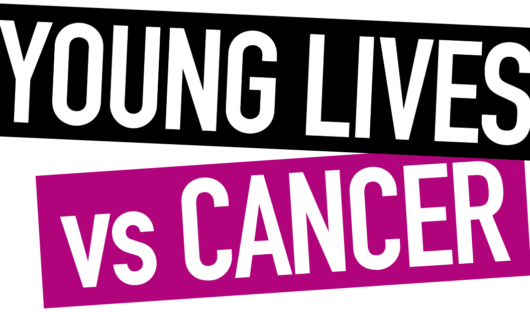Posted on Tuesday 2 April 2019
CLIC Sargent and Contact join forces to increase service offer for children and young people with cancer
CLIC Sargent, the UK’s leading cancer charity for children and young people, and Contact, the charity for families with disabled children, have announced a new partnership which will see families of young cancer patients able to access the various support services Contact provides.

Left to right - CLIC Sargent's Michelle Vernon and Andrew Cooper and Contact's Anne Brook and Alex Pook
CLIC Sargent Social Workers will signpost young people and parents to Contact, who will be able to offer specialist advice on a range of issues such as education and learning support and advice on work and childcare, as well as ongoing support once treatment has ended.
Other support available will include: advice about benefits and information on other sources of financial help, information about aids, equipment or adaptions that may be available, information on local play schemes and holidays, linking locally with other parents, and offering support to the extended family, including siblings and grandparents.
Andrew Cooper, Associate Director of Services at CLIC Sargent, said:
“We are extremely proud to announce our new partnership with Contact which will extend the support we can offer to families after they receive the devastating news that their child has cancer. We know that a child’s cancer diagnosis can completely shatter normal routines. Contact offers specialist advice on a range of topics including education, which is often disrupted when young people have to travel long distances for lifesaving cancer treatment at specialist hospitals, sometimes staying away from home for months at a time. For some children the impact of their treatment will mean that they will have ongoing education support needs and to know they have an ongoing link to Contact is really important.
“Families also find that their finances take a hit, with a parent either reducing their hours at work or stopping work completely so that they can be with their child. This happens at a time where bills are going up, with extra travel costs, energy bills, or even hospital car parking charges. Our partnership with Contact will allow us to offer families more specialist support and information on local services which will help to limit the damage cancer causes beyond a young person’s health, so that they can focus on getting well.”
Anne Brook, Director of Family Support Services at Contact says:
“We are really excited about our new partnership with CLIC Sargent. At Contact we are here to help families with a child who has any medical condition, including cancer. The challenges so many families face when their child has a medical condition or disability are often the same – such as how to get the right support for their child’s education or what services and benefits they might be entitled to. Not getting the right support in place and at the right time can have an impact on the whole family.
“Many families we work with struggle to navigate our very complex welfare, health and social care systems to find the vital help they need. That’s why Contact is here to offer advice, support and information about any aspect of raising a child with any medical condition, additional need or disability. Working in partnership with CLIC Sargent will enable us to get the essential information that families need at the earliest opportunity, leading to the best possible outcome for them.”
How to access support from Contact
Contacts for educational advice and support
Find out about useful organisations that offer information, advice and support around educational needs and issues.
Read more
ENDS
Notes to editors
- CLIC Sargent is the UK’s leading cancer charity for children, young people and families. Last year, CLIC Sargent supported around 7,200 children and young people. www.clicsargent.org.uk
- Contact is the charity for families with disabled children. Contact supports families whatever their child’s disability or medical condition, with the best possible guidance and information – from getting a diagnosis, to securing a suitable place at school, from receiving the right financial support, to finding friends and support networks. www.contact.org.uk
For more information please contact Rebecca Bourley on 020 8752 2938 or Rebecca.Bourley@younglivesvscancer.org.uk
About cancer in children and young people
Today, 12 more children and young people in the UK will hear the devastating news that they have cancer. Treatment normally starts immediately, is often given many miles from home and can last for up to three years. Although survival rates are over 80%, cancer remains the single largest cause of death from disease in children and young people in the UK.
About CLIC Sargent
When cancer strikes young lives CLIC Sargent helps families limit the damage cancer causes beyond their health. CLIC Sargent is the UK’s leading charity for young cancer patients and their families. We provide specialist support, to help and guide each young cancer patient and their family. We will fight tirelessly for them, individually, locally and nationally. For more information, visit www.clicsargent.org.uk
Note to sub editors
Please note that the name ‘CLIC Sargent’ should not be abbreviated to CLIC, and that the word ‘CLIC’ should always appear in capitals, as above.
Related Posts
Young Lives vs Cancer calls on the next Government to commit to transforming the experiences and futures of children and young people with cancer
Young Lives vs Cancer is calling on all political parties to commit to five key areas to ensure children and young people with cancer get the support they need
Statement in response to UK Government consultation on changes to Personal Independence Payment (PIP)
Young Lives vs Cancer responds to UK government launch of consultation seeking views on proposed changes to Personal Independence Payment (PIP)

